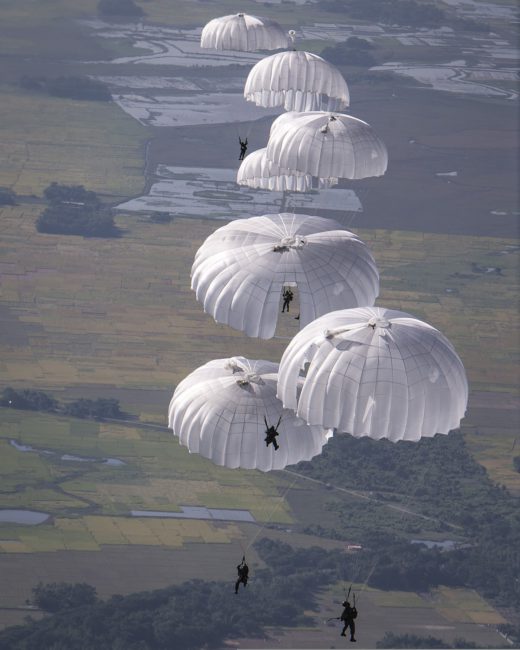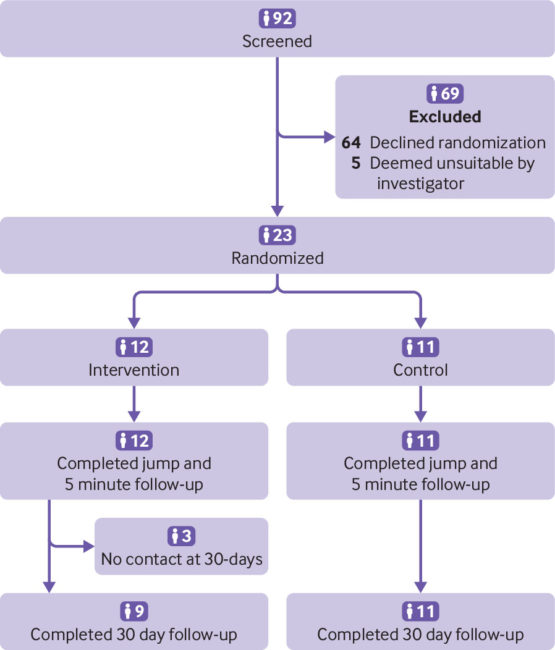
Let’s make something clear up front, this article is not actually about Parachutes. There is something far more serious coming up, so stick with me here. I will however say that the parachute study is quite real.
Within the British Medical Journal there is research paper titled “Parachute use to prevent death and major trauma when jumping from aircraft: randomized controlled trial“. Within this randomised controlled clinical trial the researchers conclusively proved that Parachutes just do not work.
The paper is not a new, it dates to 2018. Since it has not been redacted then obviously their study was indeed robust.
Seriously now, something weird is going on here. You and I know that if you were jumping from an aircraft, you would be totally crazy to decline the parachute because you believed that “parachutes don’t work”.
Let’s take a look to see what is actually going on here.
The Study
The stated objective of the study was to determine if using a parachute prevents death or major traumatic injury when jumping from an aircraft.
They lay out their reasoning as follows …
Parachutes are routinely used to prevent death or major traumatic injury among individuals jumping from aircraft. However, evidence supporting the efficacy of parachutes is weak and guideline recommendations for their use are principally based on biological plausibility and expert opinion. Despite this widely held yet unsubstantiated belief of efficacy, many studies of parachutes have suggested injuries related to their use in both military and recreational settings, and parachutist injuries are formally recognized in the World Health Organization’s ICD-10 (international classification of diseases, 10th revision). This could raise concerns for supporters of evidence-based medicine, because numerous medical interventions believed to be useful have ultimately failed to show efficacy when subjected to properly executed randomized clinical trials.
The managed to find 92 volunteers to participate who were aged 18 and over. After screening, they reduced that down to 23 participants.
Here is their flowchart of how it was run …

“You want me to do what?“
This might perhaps explain why 62 of the 92 volunteers rapidly backed out.
The selected participants were then randomly allocated a backpack with either a parachute or simply an empty backpack.
Clearly this was not a blinded study, because participants would know if they had a parachute or not. They then got them to jump from either a private or commercial aircraft between September 2017 and August 2018.
So yes, all the participants willingly jumped.
What happened?
Here briefly are the results …
Main outcome measures Composite of death or major traumatic injury (defined by an Injury Severity Score over 15) upon impact with the ground measured immediately after landing.
Results Parachute use did not significantly reduce death or major injury (0% for parachute v 0% for control; P>0.9). This finding was consistent across multiple subgroups. Compared with individuals screened but not enrolled, participants included in the study were on aircraft at significantly lower altitude (mean of 0.6 m for participants v mean of 9146 m for non-participants; P<0.001) and lower velocity (mean of 0 km/h v mean of 800 km/h; P<0.001).
Conclusions Parachute use did not reduce death or major traumatic injury when jumping from aircraft in the first randomized evaluation of this intervention. However, the trial was only able to enroll participants on small stationary aircraft on the ground, suggesting cautious extrapolation to high altitude jumps. When beliefs regarding the effectiveness of an intervention exist in the community, randomized trials might selectively enroll individuals with a lower perceived likelihood of benefit, thus diminishing the applicability of the results to clinical practice.
Did this really happen?
Yes it did.
But wait, did you read the results carefully … really carefully … I mean really really carefully.
Permit me to step you through it. Go read the results once again and ask yourself as you do so the following question – from what height did the participants jump?
Yes, there it is, buried in the details. They jumped from an astonishing height of 0.6 m … and (gasp!) those not wearing a parachute, survived.
Meanwhile, within the Conclusions we learn this … “the trial was only able to enroll participants on small stationary aircraft on the ground“, so they do go on to suggest that extrapolating their results to high altitude jumps merits a degree of caution.
“Caution” … yea, no kidding.
The research paper has pictures
Just to verify what happened, figure 2 within the paper is this …

Injuries related to gravitational challenges
To drive the point home they also make this point …
We have performed the first randomized clinical trial evaluating the efficacy of parachutes for preventing death or major traumatic injury among individuals jumping from aircraft. Our groundbreaking study found no statistically significant difference in the primary outcome between the treatment and control arms. Our findings should give momentary pause to experts who advocate for routine use of parachutes for jumps from aircraft in recreational or military settings.
Although decades of anecdotal experience have suggested that parachute use during jumps from aircraft can save lives, these observations are vulnerable to selection bias and confounding. Indeed, in seminal work published in the BMJ in 2003, a systematic search by Smith and Pell for randomized clinical trials evaluating the efficacy of parachutes during gravitational challenge yielded no published studies.1 In part, our study was designed as a response to their call to (broken) arms in order to address this critical knowledge gap.
Beliefs about the efficacy of commonly used, but untested, interventions often influence daily clinical decision making. These beliefs can expose patients to unnecessary risk without clear benefit and increase healthcare costs. Beliefs grounded in biological plausibility and expert opinion have been proven wrong by subsequent rigorous randomized evaluations. The PARACHUTE trial represents one more such historic moment.
Should our results be reproduced in future studies, the end of routine parachute use during jumps from aircraft could save the global economy billions of dollars spent annually to prevent injuries related to gravitational challenge
Rather Obviously this is not actually about parachutes
There is a study currently doing the rounds that claims that masks don’t work. As you might anticipate, the anti-mask folks are going quite orgasmic over it and will cite it on a regular basis to anybody interacting with them.
The specific study I refer to is this Cochrane study : Physical interventions to interrupt or reduce the spread of respiratory viruses
Cochrane studies are embraced by many as the gold standard. The above is a study that appears to cast serious doubt upon mask usage, hence it is deemed by the anti-mask brigade as a slam dunk definitive “no”. For example, the study’s plain language summary claims …
We are uncertain whether wearing masks or N95/P2 respirators helps to slow the spread of respiratory viruses based on the studies we assessed.
If indeed you can grasp why the published parachute study is seriously flawed, then you will be able to make the leap to an understanding that the publication of a legitimate study within a serious journal can also be seriously flawed. In this case, to briefly sum it up with three points …
- The mask study was limited in scope
- The methodology utilised was deeply problematic
- It does not actually show that masks do not work
Various reports claim it does show that masks do not work, but they are fundamentally wrong.
Dr Steven Novella, a clinical neurologist and associate professor at Yale University School of Medicine, explains over on Science Based Medicine within a very detailed and comprehensive article, exactly what is wrong with the claim that this study verifies that masks do not work – “Masks Revisited” Feb 15, 2023
He himself knows that masks do indeed work. I’ve personally listened to him explain that within his hospital he carefully masked up using an N95 for almost two years and was in regular contact with COVID patients, yet he dod not get COVID from that clinical setting. To suggest to him that masks do not work would be as credible as the suggestion that parachutes do not work.
Seriously, masks work, they really do …
Epidemiological studies provide perhaps the best evidence for the efficacy of masks, or more specifically, mask policies. One study comparing mask-wearing policies in different states in the US found that after states initiated mask-wearing policies, the spread of the virus decreased. Another study found that the risk of a spreading event was far greater in “mask-off” social settings than “mask-on” settings. Comparing countries with different mask-wearing policies also finds a good correlation with reduced spread.
How does the Cochrane mask study align with the parachute study?
There are studies regarding mask usage in low risk situations. They will not find any statistical benefit to masks, not because the masks did not work, we know they do, but because it was a study of mask usage in a low risk situation.
Picking such studies for a meta-analysis of mask usage and then using then to claim that masks do not work is literally akin to doing a study of parachute usage in a very low risk scenario and then attempting to extrapolate that usage to all scenarios.
The parachute study was of course tongue-in-cheek to make a point about such dubious studies.
One Last Thought
Mask usage has become deeply politicised. Your stance regarding mask usage will most probably identify which specific political tribe you belong to. This issue is just not going to go away and will, like rumours of Bigfoot, persist and live on.
In this specific case, one tribe has more or less embraced the idea that jumping from 10,000 ft without a parachute is just fine and a personal choice because the evidence is clear, parachutes don’t work.
Splat!